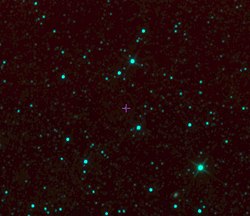EPIC 204376071
EPIC 204376071是一颗在天球上位于天蝎座的M型恒星。盖亚任务的视差观测资料显示该恒星距离地球440光年(130秒差距)[2][3][5]。该恒星可能是上天蝎星协的成员星,并且是尚未成为主序星的年轻恒星[2]。
| 观测资料 历元 J2000.0 (ICRS) | |
|---|---|
| 星座 | 天蝎座 |
| 星官 | |
| 赤经 | 16h 04m 10.1267s[1] |
| 赤纬 | -22° 34′ 45.5503″[1] |
| 视星等(V) | |
| 特性 | |
| 演化阶段 | M[2] |
| 天体测定 | |
| 自行 (μ) | 赤经:-11.544[1] mas/yr 赤纬:-24.892[1] mas/yr |
| 视差 (π) | 7.3908 ± 0.1944[1] mas |
| 距离 | 440 ± 10 ly (135 ± 4 pc) |
| 详细资料 | |
| 质量 | 0.161±0.028[2][3] M☉ |
| 半径 | 0.631±0.042[3] R☉ |
| 亮度 (bolometric) | 0.0273±0.0020[2] L☉ |
| 温度 | 2960±75[2] K |
| 自转 | 1.63 days[4] |
| 年龄 | 10[5] Myr |
| 其他命名 | |
| 参考数据库 | |
| SIMBAD | 资料 |
概要
编辑天文学家观测到EPIC 204376071有不寻常的亮度波动,包含高达80%的亮度下降(单次亮度下降80%的深度掩星,并且时间持续一日)[3][5]。不寻常的光度下降不仅幅度极大,而且在光变曲线图上显示是不对称变化,亮度上升过程持续时间是下降的两倍[4]。尽管如此,EPIC 204376071的异常亮度大幅下降已经远超过KIC 8462852的22%[6][7]。天文学家已经提出数个EPIC 204376071大幅度下降的可能原因:第一个是环绕该恒星的尘埃或小颗粒物质;第二个则是接近恒星共转半径的尘埃物质瞬时吸积事件[3]。EPIC 204376071的异常光变曲线与拥有系外型星候选天体的恒星KIC 10403228类似,并且后者的光便被认为是行星拥有的倾斜环系统引起。天文学家认为在EPIC 204376071的情形中,如果该恒星旁边环绕的棕矮星或巨行星拥有还系统,也会造成类似的光变曲线[5]。
EPIC 204376071周围被宇宙尘或小颗粒物体环绕的想像图。
参见
编辑- 瓦解的行星
- EPIC 204278916:显示异常亮度变化的恒星
- KH 15D:亮度异常变化的联星系统
- KIC 8462852 – Tabby星
- 1SWASP J140747.93-394542.6:有环系统对应异常星食的恒星
- 双鱼座RZ:异常亮度变化的恒星
- WD 1145+017:使行星粉碎并在周围产生尘埃盘的白矮星
参考资料
编辑- ^ 1.0 1.1 1.2 1.3 1.4 1.5 Staff. EPIC 204376071 -- Star in Association. SIMBAD. 2019 [6 March 2019]. (原始内容存档于2019-04-02).
- ^ 2.0 2.1 2.2 2.3 2.4 2.5 Rappaport, S.; et al. Deep Long Asymmetric Occultation in EPIC 204376071 (PDF). Monthly Notices of the Royal Astronomical Society. 22 February 2019 [6 March 2019]. doi:10.1093/mnras/stz537. (原始内容存档 (PDF)于2019-04-02).
- ^ 3.0 3.1 3.2 3.3 3.4 Rappaport, S.; et al. Deep Long Asymmetric Occultation in EPIC 204376071. Monthly Notices of the Royal Astronomical Society. 22 February 2019 [6 March 2019]. doi:10.1093/mnras/stz537. (原始内容存档于2019-03-06).
- ^ 4.0 4.1 Nowakowski, Tomasz. Astronomers detect deep, long asymmetric occultation in a newly found low-mass star. Phys.org. 5 March 2019 [6 March 2019]. (原始内容存档于2019-04-02).
- ^ 5.0 5.1 5.2 5.3 Starr, Michelle. Astronomers Have Discovered Another Mysterious Dimming Star, And It's Even More Epic. ScienceAlert.com. 6 March 2019 [6 March 2019]. (原始内容存档于2021-01-05).
- ^ Carpineti, Alfredo. We've Just Found Another Mysteriously Dimming Star In The Galaxy. IFLScience.com. 6 March 2019 [6 March 2019]. (原始内容存档于2020-11-08).
- ^ Valdez, Rubi. Another Dimming EPIC Star Is Likely An Alien Planet, Astronomers Say. Tech Times. 8 March 2019 [8 March 2019]. (原始内容存档于2019-04-02).
外部链接
编辑- YouTube上的Video (00:13) – EPIC 204376071亮度下降最高达到80%。
